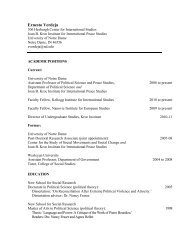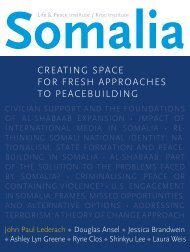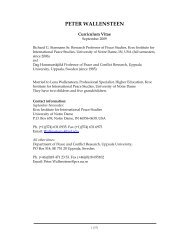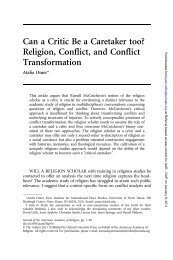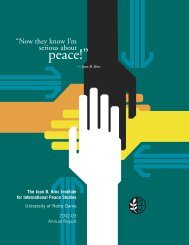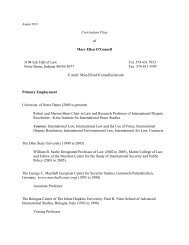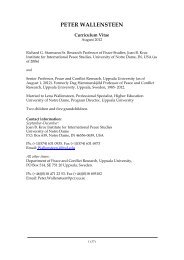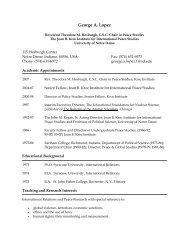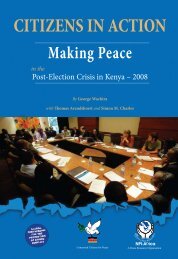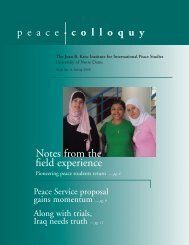Quality Peace: The Role of Third Parties and the Search for Indicators
Quality Peace: The Role of Third Parties and the Search for Indicators
Quality Peace: The Role of Third Parties and the Search for Indicators
Create successful ePaper yourself
Turn your PDF publications into a flip-book with our unique Google optimized e-Paper software.
<strong>Quality</strong> <strong>Peace</strong><br />
<strong>The</strong> <strong>Role</strong> <strong>of</strong> <strong>Third</strong> <strong>Parties</strong> <strong>and</strong> <strong>the</strong> <strong>Search</strong> <strong>for</strong> <strong>Indicators</strong><br />
May 3-5, 2012
<strong>Quality</strong> <strong>Peace</strong>: <strong>The</strong> <strong>Role</strong> <strong>of</strong> <strong>Third</strong> <strong>Parties</strong> <strong>and</strong> <strong>the</strong> <strong>Search</strong> <strong>for</strong> <strong>Indicators</strong><br />
<strong>The</strong> conference is associated with a National Science Foundation grant awarded to Erik Mel<strong>and</strong>er, John Darby,<br />
<strong>and</strong> Peter Wallensteen. Its main aim is to explore <strong>and</strong> develop <strong>the</strong> concept <strong>of</strong> <strong>Quality</strong> <strong>Peace</strong> by examining what<br />
would constitute a successful peace process <strong>and</strong> how success might be measured.<br />
Recent years have seen a significant growth <strong>of</strong> research on <strong>the</strong> success or failure <strong>of</strong> peace processes, <strong>and</strong> practitioners<br />
have been eager to find examples <strong>of</strong> good practice. Some <strong>of</strong> <strong>the</strong>se practices, such as proximity talks in<br />
South Africa <strong>and</strong> Latin American Truth Commissions, have been widely imitated <strong>and</strong> adapted by practitioners<br />
in o<strong>the</strong>r peace processes. <strong>The</strong> search <strong>for</strong> models <strong>of</strong> best practice, however, suffers from <strong>the</strong> lack <strong>of</strong> an agreed<br />
framework on what constitutes success. This NSF project aims to create such a framework.<br />
Conference organizers have identified five major factors that may promote <strong>and</strong>/or frustrate a stable peace: <strong>The</strong><br />
role <strong>of</strong> civil society; economic reconstruction; post-agreement security; transitional justice <strong>and</strong> reconciliation;<br />
<strong>and</strong> negotiations. Experts from each <strong>of</strong> <strong>the</strong>se fields attended a workshop at <strong>the</strong> Kroc Institute in November<br />
2010. This year’s conference is much broader, as practitioners <strong>and</strong> researchers will fur<strong>the</strong>r <strong>the</strong> <strong>Quality</strong> <strong>Peace</strong><br />
research agenda.<br />
Conference Agenda Hesburgh Center <strong>for</strong> International Studies<br />
Thursday, May 3<br />
6:00 p.m.<br />
7:00 p.m.<br />
Club Naimoli<br />
Friday, May 4<br />
8:15 a.m.<br />
8:30 a.m.<br />
C103<br />
Dinner Club Naimoli in <strong>the</strong> Purcell Pavilion, University <strong>of</strong> Notre Dame<br />
Welcome & Introduction<br />
R. Scott Appleby, Kroc Institute<br />
<strong>The</strong> Meaning <strong>of</strong> <strong>the</strong> <strong>Quality</strong> <strong>of</strong> <strong>Peace</strong><br />
Scott Appleby, Kroc Institute (chair)<br />
Erik Mel<strong>and</strong>er, Kroc Institute <strong>and</strong> University <strong>of</strong> Uppsala<br />
Peter Wallensteen, Kroc Institute <strong>and</strong> University <strong>of</strong> Uppsala<br />
John Paul Lederach, Kroc Institute<br />
Madhav Joshi, Kroc Institute<br />
Depart from Ivy Court Hotel<br />
Reconciliation <strong>and</strong> Dealing with Past Violence<br />
Papers:<br />
“<strong>The</strong> Challenges <strong>of</strong> Reconciling <strong>the</strong> Old <strong>and</strong> <strong>the</strong> New in Truth <strong>and</strong> Reconciliation<br />
Commission Processes: <strong>The</strong> Case <strong>of</strong> Solomon Isl<strong>and</strong>s”<br />
Karen Brounéus <strong>and</strong> Holly Guthrey, National Centre <strong>for</strong> <strong>Peace</strong> <strong>and</strong> Conflict Studies,<br />
University <strong>of</strong> Otago<br />
“Reconciliation’s Contributions to <strong>Quality</strong> <strong>Peace</strong>”<br />
John Darby, Alex<strong>and</strong>er Dukalskis, <strong>and</strong> Laura K. Taylor, Kroc Institute<br />
“Factoring Transitional Justice into <strong>the</strong> <strong>Quality</strong> <strong>Peace</strong> Equation”<br />
David Backer, University <strong>of</strong> Maryl<strong>and</strong>
10:00 a.m.<br />
10:30 a.m.<br />
C103<br />
12:00 p.m.<br />
1:30 p.m.<br />
C103<br />
3:00 p.m.<br />
3:30 p.m.<br />
C103<br />
“<strong>Quality</strong> <strong>of</strong> <strong>Peace</strong> in Cambodia: 20 Years after <strong>the</strong> Paris <strong>Peace</strong> Agreement”<br />
Kheang Un, Nor<strong>the</strong>rn Illinois University<br />
Discussants:<br />
Peter Wallensteen, Kroc Institute <strong>and</strong> University <strong>of</strong> Uppsala (chair)<br />
Fanie Du Toit, Kroc Visiting Fellow/IJR in Cape Town, South Africa<br />
Erik Mel<strong>and</strong>er, Kroc Institute <strong>and</strong> University <strong>of</strong> Uppsala<br />
Break<br />
Post Agreement Security<br />
Papers:<br />
“<strong>Peace</strong> Implementation <strong>and</strong> <strong>Quality</strong> <strong>Peace</strong>”<br />
Terence Lyons, George Mason University<br />
“Same <strong>Peace</strong> – Different <strong>Quality</strong>? <strong>The</strong> Importance <strong>of</strong> Security Equality <strong>for</strong> <strong>Quality</strong> <strong>Peace</strong>”<br />
Louise Olsson, Folke Bernadotte Academy, Sweden<br />
“El Salvador: Successful Democratization but Questionable <strong>Peace</strong>”<br />
Dinorah Azpuru, State University<br />
Discussants:<br />
Madhav Joshi, Kroc Institute (chair)<br />
Albrecht Schnabel, Geneva Centre <strong>for</strong> <strong>the</strong> Democratic Control <strong>of</strong> Armed Forces<br />
Lunch<br />
Civil Society <strong>and</strong> Governance<br />
Papers:<br />
“Civil Society <strong>and</strong> <strong>Quality</strong> <strong>Peace</strong>: What Happened in El Salvador”<br />
Richard Jones, Catholic Relief Services, El Salvador<br />
“Governance <strong>and</strong> Negotiations: Whose <strong>Quality</strong> St<strong>and</strong>ards?”<br />
Roger Mac Ginty, University <strong>of</strong> Manchester, UK<br />
“<strong>Quality</strong> <strong>Peace</strong> Nor<strong>the</strong>rn Irel<strong>and</strong> Case Study”<br />
Colin Knox, University <strong>of</strong> Ulster<br />
Discussants:<br />
Erik Mel<strong>and</strong>er, Kroc Institute <strong>and</strong> University <strong>of</strong> Uppsala (chair)<br />
Jaco Cilliers, UNDP Uzbekistan<br />
Break<br />
A Quantitative Approach to <strong>Quality</strong> <strong>Peace</strong><br />
Papers:<br />
Christian Davenport, Kroc Institute
6:30 p.m.<br />
6:45 p.m.<br />
Saturday, May 5<br />
8:15 a.m.<br />
8:30 a.m.<br />
C103<br />
10:00 a.m.<br />
11:45 a.m.<br />
Erik Mel<strong>and</strong>er, Kroc Institute <strong>and</strong> Uppsala University<br />
Pat Regan, Binghamton University<br />
Discussants:<br />
Peter Wallensteen, Kroc Institute <strong>and</strong> University <strong>of</strong> Uppsala (chair)<br />
Scott Gates, <strong>Peace</strong> Research Institute Oslo (PRIO)<br />
Meet in <strong>the</strong> lobby <strong>of</strong> Ivy Court Hotel to walk to dinner<br />
Dinner<br />
<strong>The</strong> Mark Restaurant, Eddy Street Commons<br />
Depart from Ivy Court Hotel<br />
Concluding Roundtable<br />
Erik Mel<strong>and</strong>er, Kroc Institute <strong>and</strong> Uppsala University (chair)<br />
All participants<br />
Break/Free Time<br />
Optional lunch <strong>and</strong> adjournment<br />
Acknowledgment <strong>of</strong> papers received but not presented at this conference<br />
“Mozambique: A Credible Commitment to <strong>Peace</strong>”<br />
Carrie Manning <strong>and</strong> Chipo Dendere, Georgia State University<br />
“Is Civil Society Needed <strong>for</strong> <strong>Quality</strong> <strong>Peace</strong>?”<br />
Thania Paffenholz, Graduate Institute <strong>of</strong> International Relations <strong>and</strong> Development, Geneva<br />
“<strong>Peace</strong> Processes, Economic Recovery <strong>and</strong> Development Agencies”<br />
Achim Wennmann, Centre on Conflict, Development <strong>and</strong> <strong>Peace</strong>building, Geneva<br />
“Business on <strong>the</strong> Frontlines”<br />
Viva Bartkus, Mendoza School <strong>of</strong> Business, University <strong>of</strong> Notre Dame<br />
“Approaches to Negotiations in Post-Civil War Settings: <strong>The</strong> <strong>Role</strong> <strong>of</strong> Local Institutions”<br />
Jenny Guardado, Leonard Wantchekon, Sarah Weltman, Princeton University



